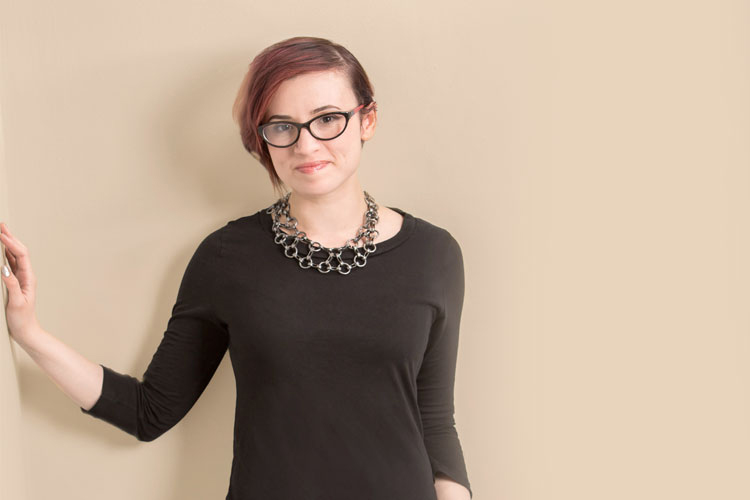From the Women’s Prize Archives.
With this year’s brilliant shortlist now out, we caught up with marvellous 2016 judge Laurie Penny. Read on to find out what she’s looking for in a Baileys Women’s Prize for Fiction winning novel, Laurie’s thoughts on the underrepresentation of women novelists and her self-set Shakespeare challenge!
What challenges do you think women writers face?
Women writers are still hidebound by a culture that assumes that whatever we are, we are women first- that we cannot communicate that ‘universal’ quality that everyone expects of great literature. Of course, when we speak of the ‘universal’ experience, we are usually speaking about men’s experience- because women and LGBTQ people grow up being encouraged to empathise with men’s internal worlds, but men grow up assuming that women’s worlds have little relevance to their own lives.
Since the dawn of the novel, a large number of our greatest authors have always been women- I don’t understand how this can be a controversial opinion. If anything, male writers often seem to find it harder to transcend gender than women do- so many of my favourite male novelists still struggle with a certain narrowness of vision born of unexamined privilege. Of course, the best writers always have that ‘negative capability’ that goes beyond the individual.
Unlike other creative endeavours, writing is something that women can do alone, without having to compromise with anything but our own self-doubt in the actual production of the work. I believe that’s one reason that at least half of the best writers of our age are women, if not more. The fact that female writers still struggle to be taken seriously as artists speaks of a massive, concerted effort on the part of publishers, readers and critics to ignore how good women actually are. How else could you explain it?
What are you looking for in a winning book?
I have very high expectations, and they haven’t been disappointed in my reading so far. I want a book that sinks subtle talons into my brain and doesn’t let go. I want brilliant characters and beautiful language. I want a book that is brave in its understanding of what a story can and should be. I want a book that is engaging, original, with gorgeous prose that leaves me gasping- but most of all, more than anything else, I want a good story. Decent prose isn’t enough. I also want to be entertained. I want the writer to take my hand, lead me through the dark forest of her imagination, and bring me out to the light again, changed. I want it all, and I want it to be fun. I don’t think that’s too much to ask.
Why do you think the Baileys Women’s Prize for Fiction is important?
It has always stunned me that women writers are so underrepresented by every measure of the modern canon – and prizes matter when it comes to developing that canon. The books we read shape our understanding of whose words and whose experiences count.
I’m reminded of this whenever I’m brave enough to open up my online dating page and notice how many perfectly decent-seeming men name no women authors in a long list of favourites. Or whenever a friend asks me to recommend ‘a novel by a woman, to get started.’ It angers me, of course- but it also saddens me deeply, as someone who loves books, that so many people could miss out on so many good ones simply because they have internalised the idea that women’s stories aren’t relevant. Especially if they’re already adults, and have lost the chance to delve deeply into all that brilliant writing that happens to be by women whilst still in their teens, when literature touches you in that unique and special way.
That’s why, in a culture that still gives most of the big prizes to men, we still need an award in the arts just for women. It’s in everyone’s interest to even the score.
If you could choose one woman (dead or alive) to be in a bookclub with, who would you choose?
I’m already in the world’s best bookclub, as I get to read all these amazing novels in the company of the Baileys judges- one of whom is already a favourite author of mine! But right now I’d give anything to be able to spend an afternoon talking about books with the late Octavia Butler.
If you could only have three books on your bookshelf, what would they be?
Come on. This isn’t fair. I reject the terms of the question unless I’m also allowed to keep hundreds of other books on my floor, desk and e-reader. But the three books on my shelf this week are Nalo Hopkinson’s ‘Brown Girl In The Ring’, Ken Liu’s ‘The Paper Menagerie’, and Kate Chopin’s ‘The Awakening.’ I can’t wait to get started with them! I’m also on a Shakespeare kick. I’m trying to re-read all the plays before I turn thirty in a few months. Including the rubbish ones and the silly ones, to remind me that even the greats had days when they were just phoning it in.



